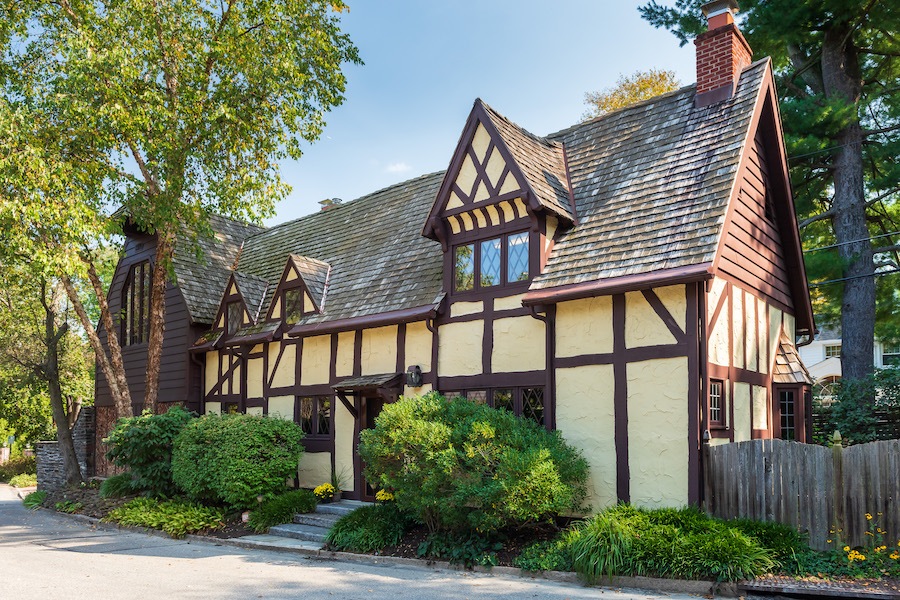Has Coronavirus Changed the Real Estate Market?
The good news: As of now, new listings continue to pour in, and technology allows sales to continue. The bad news: No one knows whether all this will continue if the emergency drags on.

This authentic Tudor Revival house in a historic Wynnewood development was all ready to go to market. COVID-19 gave the agent pause, and as a result, she paused the sale for a while. | Photo: Michael Eckstrom via Julie Schultz, Long & Foster Real Estate
The owner of 649 Loves Lane in Wynnewood was all ready to pull the trigger.
The Tudor Revival house, part of a unique, historic community built on the eve of the Great Depression, had gotten spruced up and furnished for a faster sale after the original listing was removed late last fall.
And the agent had contacted Philly Mag about featuring the house. She had given a tour, sent photos, and was all ready to relist the house this week.
I was all ready to feature it too, for as that photo should make clear, this house is a true standout with character and an interesting story.
But you won’t be reading that story this week, or next week for that matter, or maybe not even the week after that.
Why?
“We had all the paperwork to relist, and then, with COVID, thought we should wait two weeks,” e-mails Julie Schultz of Long & Foster, the agent marketing 649 Loves Lane.
Even though technology has shaken up the way people buy and sell real estate, the business remains one built on personal relationships. And the measures put in place to keep the COVID-19 coronavirus outbreak from turning into a greater disaster have put barriers in the path of those relationships.
But not insurmountable ones. And again, that’s thanks to technology.
What is happening in the short term is this: Agents are still listing homes for sale but taking most of the sale process into cyberspace. Buyers are still on the prowl, lured by record-low mortgage rates, but finding less to buy thanks to trends set in motion before news of a scary new disease came out of Wuhan, China.
On the listing-activity side, while some sellers took their homes off the market once local, state and Federal authorities ordered everyone to practice “social distancing,” the pace of new listings has not really abated, says Compass Real Estate agent Adam Baldwin.
In a March 18th email, Baldwin laid out the following:
- In the previous seven days in Philadelphia, there were 1,543 active listings. Of those, 560 were new listings and 61 were “coming soon” listings
- 123 homes were temporarily taken off the market, and 112 listings were withdrawn, which is a degree higher than normal
- 135 listings expired, a typical number
- 884 homes went under contract or pending, and 234 homes closed
- There were also 526 price reductions — this is the largest change
“Still, twice as many homes came on the market as came off it, and more than half the available inventory received offers that were accepted,” says Baldwin. “It was business as usual this week.”
But, he adds, “the next two (or more) weeks will be the litmus test, as real estate is a lagging indicator of economic performance.”

On the other hand, Peter Rotelle says traffic remained strong at the company’s new model home in East Nantmeal Township, Chester County, which made its debut Feb. 29th. | Photo: Sandy Smith
Chester County builder-developer Peter Rotelle echoes Baldwin’s business-as-usual sentiments. “We haven’t had any canceled contracts” for new custom homes, says the CEO of Rotelle Development Company. “It’s a fluid situation that’s changing sometimes by the day, the hour and the minute, but this last weekend we were fortunate to have a good weekend in terms of traffic and sales, which I’m grateful to see because it shows there’s still momentum even in these uncertain times.”
On the operational side, agents and brokerages have heeded the local, state and Federal government calls to put some distance between themselves and the public.
For instance, Berkshire Hathaway HomeServices Fox & Roach, the largest brokerage in the Greater Philadelphia region, asked its agents to cancel all public and agent open houses as of March 16th. “We are fortunate that the majority of our processes can be completed electronically, from listing documents to agreements of sale to settlement procedures,” agent Scott Laughlin wrote his contacts in an email that day.
Rachel Street is one of those agents who is in a unique position to give an overview of how the whole development and sales business is functioning now; she runs both a residential rehabber, Hestia Construction, and a sales team at Space & Company.
Since construction activity was permitted to continue under the city’s order closing all nonessential businesses, Hestia’s construction projects are proceeding, she says, but with some modifications. “I gave my crew a bunch of cash as a backup in case for some reason payroll doesn’t go through, and I’m only allowing one or two people to work at a time at each project, but only those where there are no other outsiders coming in,” she says. “All supplies are being delivered so there is no contact with stores.”
And as the city has kept its Recorder of Deeds office open, sales transactions can continue normally, but in a hands-off fashion. “We are working to close all current real estate transactions but not allowing anyone at the office,” she says. “Everyone must sign a deed package and wire funds.”
The other most personal part of the sales process has also gone virtual, she adds. “We are no longer hosting open houses and showing mostly vacant properties only,” she says. “We are also doing virtual tours of properties with cell phone video and sharing them with our office so others can ‘show’ the same house if our client isn’t interested.”
So buyers starting their house hunt now need not worry, right? After all, new houses continue to come on the market, agents can show houses virtually, transactions can be handled electronically, and buyers will get really great mortgage rates.
Not so fast, says Kevin Gillen, senior research fellow at Drexel University’s Lindy Institute for Urban Innovation. COVID-19 hasn’t derailed some trends that were already affecting buyers before the pandemic spread to these shores.
“Inventories have plunged to unprecedented lows,” he says. “There’s only two months’ supply as of the end of January.”
Gillen doesn’t expect the current crisis to push inventories upward, either — and on top of that, he says, “because buyer demand is slackening because of the coronavirus, the liquidity is being wrung from the system.”
Activity on the commercial side of the market has already come to a standstill, he says, and the same thing could happen on the residential side.
Nor will super-low interest rates help keep the wheels turning, he adds: “Just because the money is almost free doesn’t mean the bank is going to lend it to you.” With layoffs on the rise and wealth being destroyed on Wall Street, Gillen says this may actually not be the best of times for would-be house-buyers.
“There’s a general economic principle: In times of great uncertainty, you don’t make large investments.”
Gillen’s forecast: “I don’t think [COVID-19] is going to hurt the market as much as put it in a coma for a little bit. Once the crisis passes and market forces resume, then we can assess where things are.”
The silver lining in this cloud for those who can still take advantage of the current state of affairs: If you find you can still afford to buy a house right now, you’re likely to find not only bargain-basement mortgages but motivated sellers who have lowered prices to meet buyers’ levels of tolerance. And there will be plenty of agents ready to walk you through the process — just as long as you don’t take them by the hand.


